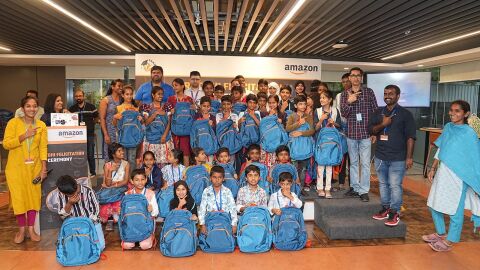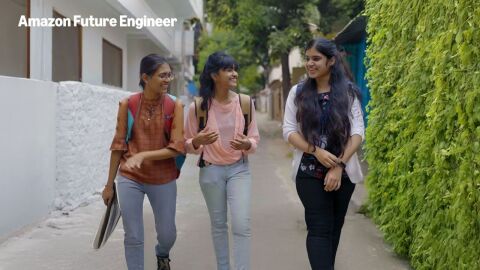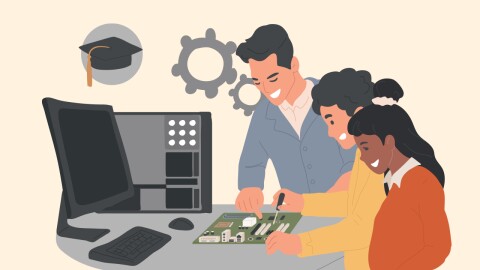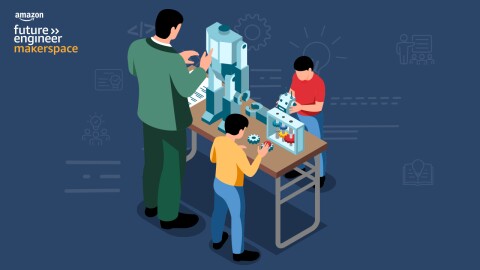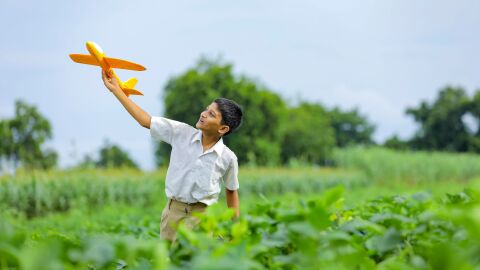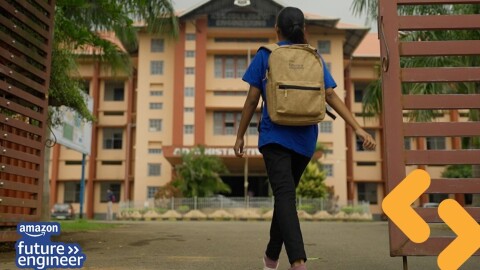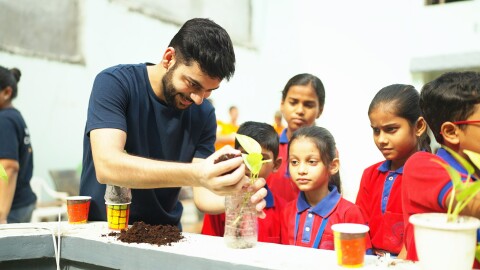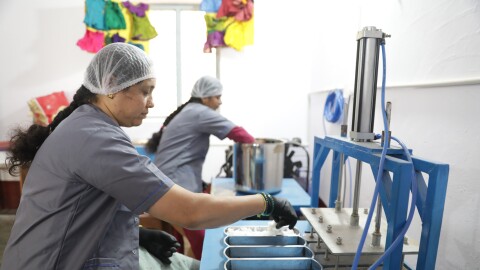
Building future engineers and with a focus on underserved kids in India, how do you view the Amazon Future Engineer program, especially given your India connect?
A 2020 World Economic Forum study estimated that it will take an Indian child born into a low-income family, seven generations, to reach the country’s mean income level. Together, AFE and Code.org are grappling with this – how do we help that child break the cycle in a single generation? We imagine a pathway for a child who saw no way out of poverty, destined for child marriage or an insecure, hand-to-mouth job, to become self-confident young adults with a stable future. Coding and Computer Science (CS) education can lead to employment in the organized sector. These students, children and grandchildren will never experience dire poverty. Successive generations of humanity will benefit economically.
School systems focus on basic literacy and numeracy skills; AFE and Code.org, along with our India-based partners, will add CS education to these foundational learnings.
Working incrementally at the community level won’t address the scope of the problem. As 253 million adolescents become job-seekers, no more than one-third will have a higher secondary qualification. Of these, only two in five will have the skills for employment. School systems focus on basic literacy and numeracy skills; AFE and Code.org, along with our India-based partners, will add CS education to these foundational learnings.
On a personal level, I was born in Mumbai and still consider India home in many ways. I am deeply optimistic about the power of computer science in rural and urban communities, not just the potential for the upliftment of individual families out of poverty and putting individuals on a different economic track, but also the potential that computer science education and the problem solving skills it engenders as a way to help youth (the future civic leaders) solve some of the large problems in Indian society at all economic levels. For example - when classrooms of students complete the AI for Oceans tutorial, this can translate to an appreciation of India's waterways and lead youth in both rural and urban communities, at all economic levels, to consider how CS might be used to solve the problems of climate change.
There are many life lessons that coding can give - to never give up, to look for different solutions something children (and even adults) can hugely benefit from. How do you look at coding?
Beyond learning the technical skills needed for computing jobs, research has shown that studying computer science has many other benefits. For example, students who study computer science do better at generic problem-solving challenges involving executive/planning skills and the more time students spend learning computer science, the better their test scores in reading, writing, math, and science. Computer science is also impacting every industry from agriculture to medicine and from hospitality to entertainment.
So no matter what career path a student ultimately chooses, they should have the opportunity to learn the basics of computer science like algorithms, how to make an app, or how the internet works as a foundational part of their education, just like they learn about photosynthesis, the digestive system, or electricity. Computer science is about more than just coding - it imparts a way of thinking and problem solving that is beneficial in all facets of life, both professional and personal.
Employability is a big issue these days with many having degrees, but not the skills for a job. How often do you see this gap and how do you think programs like AFE bridge this?
Around the world we’re seeing the rapid creation of new computing jobs but not enough students are receiving the training and experience they need to fill those roles. This gap is definitely present in India and programs like AFE are critical not only for directly providing students with necessary skills but also for helping the formal education system better understand the subjects students need to study in order to be prepared to enter the modern workforce.
Content in regional languages is a powerful force when youth consider what role computer science can play in their future and their communities.
Not just contextualization content, but also serving it in regional languages makes it inclusive. Will you say breaking language barriers is key to getting more kids drawn to AFE?
At Code.org, we strive to provide students high-quality computer science content in their mother tongue. Learning a new subject is already challenging, so eliminating the need to learn it through a different language removes a potential additional barrier. Providing translated and localized content is a key part of the work to ensure all students have equal access to these important resources. Furthermore, we should consider the important role that language plays in developing a young person’s identity and sense of belonging.
Consider for a moment - what language do you dream in? What language do you problem- solve in? How is language tied to the communities you belong to and the people that you love? These are powerful influences on a young person’s life. Now consider the power of experiencing high-quality computer science content in the language that you most closely identify with. Content in regional languages is a powerful force when youth consider what role computer science can play in their future and their communities.
Finally, if you were a student today and was learning coding - what would you have liked to build?
There are so many things I would have built, if I had the opportunity to learn computer science as a young person. I wish I could say that I would have been focused on solving the problems of the world. But more likely I would have been thinking about my day to day experiences. Maybe I would have built a program that does my math homework for me, a sensor on my bedroom door that would close if my little brother was coming (usually to annoy me!) but swing open if my parents are approaching (as we weren’t allowed to play with the doors closed in our house) and probably some kind of way to communicate with my friends (my mother loved talking on the phone and we were forever waiting for the land line to be available to call our friends!)
But this is why we at Code.org are so proud of our partnership with AFE. Indian students of today hold the potential to think globally while acting locally.




